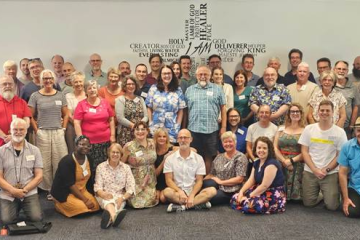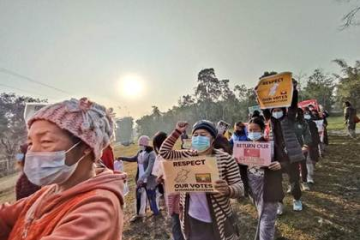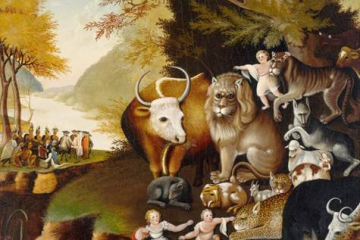Acts 8:26-40, John 15:1-8
In 1988 I caught a bus from Sydney to Brisbane (which I suspect took longer than the 16 hours it apparently takes now) to join some friends to go to Expo 88. (Some of you will remember that!) Now a 16 hour plus bus ride is uncomfortable enough, but what made it even more uncomfortable was that drilled into me, as a good evangelical girl, was that between Sydney and Brisbane I had to share the gospel with the man, a man in his thirties, sitting next to me. After all, to paraphrase Acts 8:36, “Look, here are 16 hours! What was to prevent me from converting someone in that time?”
I was a dismal failure. To be fair I was a 19 year old girl on a 16 hour plus bus ride and I think my self-preservation instincts kicked in harder than my evangelical zeal, but that did not stop me being wracked by guilt all the way from Sydney to Brisbane, especially as the first question my friends asked when they picked me up in Brisbane was, had I managed to convert the person next to me on the bus?
But when I think about that bus ride – and compare it with the chariot ride in our passage this morning I realise an essential part of authentic mission was missing on that bus– authentic relationship. I am not expecting my 19-year-old self to befriend a man on a long-haul bus trip (I would caution my daughters against that!) but good mission is much more than ‘trying to convert someone’, much more than a one-way conversation on a one-way trip to Brisbane. Authentic relationship is a two-way street. It is about listening to others and being prepared to learn from them. It is about sharing your life with others and being prepared to share theirs. As the Global Interaction animation said, authentic relationships are about coming alongside others.
The first thing that coming alongside other involves is being ‘Spirit led’ as the animation said, to be led by the Spirit of God.
In our reading, Philip is spoken to – interchangeably – by an angel of the Lord and the Spirit, reflecting the many ways God can speak to us; through the Word, through our heart’s own inclinations, through others, even strange interactions we later think angelic. The angel tells him, “Get up and go south. Stand alongside the road that goes from Jerusalem to Gaza.” And we’re told in parentheses, “This is a wilderness road.” In other words, go and stand in the middle of nowhere, in woop woop, and I love Phillip’s response, “So he got up and went!”
And when the Ethiopian eunuch’s chariot appears, the Spirit tells him, “Go over to this chariot and join it.” Effectively, jog along alongside it. (You hope the chariot wasn’t travelling at high speed. You also hope Phillip was reasonably fit.) But it’s hard to find out that a man in a moving chariot is reading from the book of Isaiah unless you are running next to it!
I think back on my childhood ‘on the mission field’ in Indonesian Papua and Papua New Guinea, about the missionaries who heard the angel of the Lord telling them to get up and go to the other side of the world, to what to them was the middle of nowhere (it was definitely ‘somewhere’ to the Danis and other indigenous groups) and wonder if they didn’t hear, as clearly, the Spirit telling them they needed to ‘join the chariot’.
Don’t get me wrong. Over the last 140 years Baptist missionaries and others have done good work, but not so good work has been done as well. Lots of the mission bases I lived on as a child looked like American suburbs but – by the grace of God – and the grace of the local people – genuine communities of faith were established there.
Assimilation, appropriate contextualisation is challenging. It must be balanced with the needs of the individuals involved, but the stories of Global Interaction missionaries seeking now not only to learn language, but also local ways and customs, to share people’s lives, to run alongside the chariots of others, to share their own are encouraging and exciting. They are being Spirit led.
And those of us who live in Australia are also called to the Spirit led in authentic mission and authentic relationship.
I was speaking to another pastor recently who has planted an inclusive LGBTIQ friendly church in a small Victorian country, somewhere on the wilderness road, not where you’d expect to find it. It came about because a friend of hers moved to that town and told her, while she was settling in, how hard it was to find a friendly church. She’d gone to every church in town, two or three Sundays in a row, and not one person ever spoke to her. So this pastor decided to cheer her up and planned a family holiday to that town, house-sitting for a friend of their friend.
The night they got there, there was no water and there was a note on the kitchen bench saying, “If the cistern’s empty, Paul next door will show you how to use the pump.” So her husband went next door, knocked and when Paul opened the door, he said, “Hallo Tom! What are you doing here!” It turns out the family next door were a family they had met one afternoon a beach in Adelaide, and got chatting, sharing their lives, because they had kids the same age. So, they were invited over for a meal and Tom and his partner shared how they’d like to go to church, but there wasn’t really a welcoming church in town. The next day, the woman telling me the story, said she ran into an old flatmate she’d lost contact with who bizarrely lived across the street, and she heard the same thing from her. “It’d be lovely to be part of a faith community here, but none of the local churches are that appealing.”
The week ended and they went home, and a friend took her out for coffee and asked, “How was the week in the country?” “All right,” she said. “Relaxing.”. “No,” said the friend, “Tell me, how was the week in the country?” So, she told her the whole story and finished with, “It just feels like there’s a lot of sheep there without a shepherd!” “That’s it,” said her friend, “That’s what I was thinking. You are meant to go and shepherd those sheep.” And that is what’s she’s done. Led by the Spirit, to build authentic relationships, to do authentic mission.
Coming alongside others also requires us to be open to others.
Verse 27 of our passage is an awkward verse to translate because it’s a strong of nominative masculine singular nouns – “man, Ethiopian, eunuch official”. I am reminded of the way I sometimes describe people, “You know, the guy with the dark hair, Asian background, who’s a doctor at the surgery…” which my children call casual racism. Which it is. And this is what we see here. To Phillip this man is geographically and ethnically ‘other’; he is culturally or religiously ‘other’ – as a eunuch his sexuality was ambiguous which according to Deuteronomy 23:1 banned his participation in worship (does any of that sound familiar?) – and as senior public servant – just as bad as the other two in the socially marginalised Christian community (I make no comment about today) – he was also ‘other’.
Yet Phillip is also ‘other’ to this man.
I have appreciated reading commentaries by several African American theologians this week. Peter Paris who says, “Philip approached the man and asked him what I have always thought was a rather rude or arrogant question: ‘Do you understand what you are reading?’…. Undoubtedly, most readers may be moved by the eunuch’s hospitable spirit of welcoming the conversation and inviting Philip to sit in his carriage to discuss the matter.”
Willie James Jennings who writes, “The eunuch asked the right question, [“Who is this person in pain and suffering, humiliation and shame?”] one that is like a prayer that God will answer. Now the body of God will be seen where no one would have imagined or dared to look, at the place of humiliation and pain and on a eunuch’s chariot.”
And Professor of New Testament at Columbia Theological Seminary, Mitzi Smith, who writes that even though the Ethiopian was a learned man who could read and understand the scriptures, “He did not allow his attainments to blind him to his limitations. We [too] should practice a faith that continually seeks understanding rather than an understanding that is seeking faithful followers. The humility by which the lamb endured his death is embodied in the Ethiopian….Despite his high social status, he invited Philip to join him.”
I love verse 31 in this passage, “And he invited Phillip to get in and sit beside him.” To get in and sit alongside him. Genuine mission is where genuine relationships take place – not where one person forces their view on other – but where they are invited to come alongside, to journey with the other.

I’ve shown you this image before. Its from an icon from the 14th century, from Decani monastery in Kosovo, and in it the heads of Phillip and the Ethiopian man are placed close together in intimate conversation.

Or in this contemporary 1950’s painting by Austrian Herbert Boeckl, Phillip and the Ethiopian Eunuch, which hangs in Angel’s Chapel, Seckau Abbey, Styria, Austria. You might notice, in something that looks like a speech bubble, the letters ‘IHS’, an abbreviation of the Greek name for Jesus – ΙΗΣΟΥΣ, (Iesous) – indicating that Christ is present – this is a holy conversation, a genuine Spirit-led interaction, as these two engage with each other.
Finally, coming alongside others requires us to be open to them in the same way that we hope they will be open to us.
This story in Acts is known as the conversion of the Ethiopian eunuch, but perhaps it is also a story of the ongoing conversion of the nice Jewish boy from Jerusalem. The Ethiopian certainly encounters the Word of God in a new way, both written and incarnate. But Phillip, too, and with him the early church, is transformed by this encounter. Everything they knew about insiders and outsiders, piety and depravity, identity and belonging has changed. Authentic mission and authentic relationship is a two-way street.
And so we come to the stunning question that the Ethiopian asks – it is him who takes the initiative – saying, “Look, here is water! What is to prevent me from being baptised”

The way this has been portrayed in art reflects the cultural attitudes that strive to maintain the power balance between missionary and missioned to, evangelist and convert (and European and non-European). Rembrandt’s painting is praised for being better than most, for creating a harmony between Phillip and the Ethiopian.
But I went looking for an image that I think expresses what is happening here much better because – in our practice of baptism at least – when people come to be baptised, we stand side by side in the waters of baptism. Baptiser and baptismal candidate stand together in the waters that represent the life we have been given, that represent the faith we share, as Mitzi Smith puts it, the faith that continually seeks understanding.
“What is to present me from being baptised?”
We need to think carefully about that question as we go about authentic mission. For Global Interaction it is a question that leads to recognising that communities of faith in other parts of the world will follow Jesus in their own distinctive ways. For us here in Canberra, in Kingston, it is a recognition that those coming to new understandings of faith, that we as we come to new understandings of faith will also follow Jesus in our own distinctive ways.
Authentic mission is Spirit led, it is about coming alongside the other and it is about continually seeking understanding, about ongoing conversion, about new ways of following Jesus.
And all this is not easy. We struggle with being open to the Spirit; to the spirit that picks us up here and plonks us down there, that asks us to come alongside people who are different to us, that calls us in our conversations to be continually seeking understanding – not applying a one size fits all way of following Jesus, of faith, of life, of church.

And yet, as Willie James Jennings joyfully puts it: “Faith found the water. Faith will always find the water….The eunuch wants God as much as God wants him. They will wait no longer for each other….God has broken the connection between identity and destiny, between definition and determination, and inserted a new trajectory.”
We, too, as we engage in authentic mission, in authentic relationships, are on that new trajectory – that two-way, that God’s way street. Let us welcome and open ourselves to those we also find on it. Amen.


